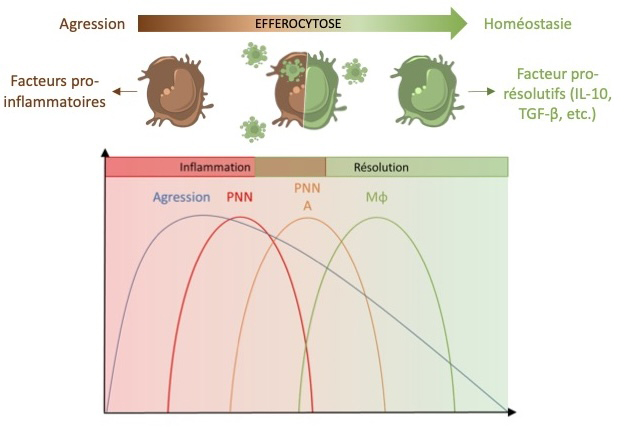| Issue |
Med Sci (Paris)
Volume 40, Number 5, Mai 2024
|
|
|---|---|---|
| Page(s) | 428 - 436 | |
| Section | M/S Revues | |
| DOI | https://doi.org/10.1051/medsci/2024050 | |
| Published online | 31 May 2024 | |
« Fort comme la mort »,* où comment l’efferocytose contrôle la résolution de l’inflammation
Strong as death or how efferocytotic macrophages promote the resolution of inflammation
1
Université de Franche-Comté, Établissement Français du Sang (EFS), Inserm, UMR 1098 RIGHT Besançon, France
2
LabEx LipSTIC, Besançon, France
3
Établissement Français du Sang, Recherche et développement, Grenoble, France
4
Université Grenoble Alpes, Inserm U1209, CNRS UMR5309, Institute for Advanced Biosciences, Grenoble, France
L’arrêt de la réponse inflammatoire, ou résolution de l’inflammation, est considéré aujourd’hui comme un processus actif lié à la production (ou à la libération) de composés anti-inflammatoires aussi appelés composés pro-résolutifs. L’évènement permettant d’enclencher la résolution de l’inflammation est l’élimination des cellules immunitaires apoptotiques par les macrophages, un processus nommé efferocytose, dont l’altération est à l’origine de différentes maladies. Dans cette synthèse, nous décrivons les étapes de cette efferocytose et les mécanismes qui en résultent et permettent de stopper l’inflammation. Nous évoquerons également de nouvelles pistes thérapeutiques fondées sur les facteurs pro-résolutifs : la thérapie résolutive.
Abstract
The resolution of inflammation is an active process leading to the restoration of tissue homeostasis. A critical step in the initiation of this process is the elimination of apoptotic immune cells by macrophages. This well-organized process, called efferocytosis, involves four different steps, namely the attraction of macrophages to the site where the cells die, the recognition of apoptotic cells, their internalization and their digestion leading to the activation of different metabolic pathways. All these steps are responsible for the reprogramming of macrophages towards a pro-resolving profile. Efferocytic macrophages produce several factors involved in the resolution of inflammation. These factors include lipids (i.e., specialized pro-resolving mediators such as lipoxins), and proteins (e.g., IL-10 or TGF-β). Here, we describe the different steps of efferocytosis and the mechanisms responsible for both macrophage reprogramming and the release of pro-resolving factors. These factors may represent a new therapeutic approach, called resolution therapy.
© 2024 médecine/sciences – Inserm
 Article publié sous les conditions définies par la licence Creative Commons Attribution License CC-BY (https://creativecommons.org/licenses/by/4.0), qui autorise sans restrictions l'utilisation, la diffusion, et la reproduction sur quelque support que ce soit, sous réserve de citation correcte de la publication originale.
Article publié sous les conditions définies par la licence Creative Commons Attribution License CC-BY (https://creativecommons.org/licenses/by/4.0), qui autorise sans restrictions l'utilisation, la diffusion, et la reproduction sur quelque support que ce soit, sous réserve de citation correcte de la publication originale.
Current usage metrics show cumulative count of Article Views (full-text article views including HTML views, PDF and ePub downloads, according to the available data) and Abstracts Views on Vision4Press platform.
Data correspond to usage on the plateform after 2015. The current usage metrics is available 48-96 hours after online publication and is updated daily on week days.
Initial download of the metrics may take a while.





